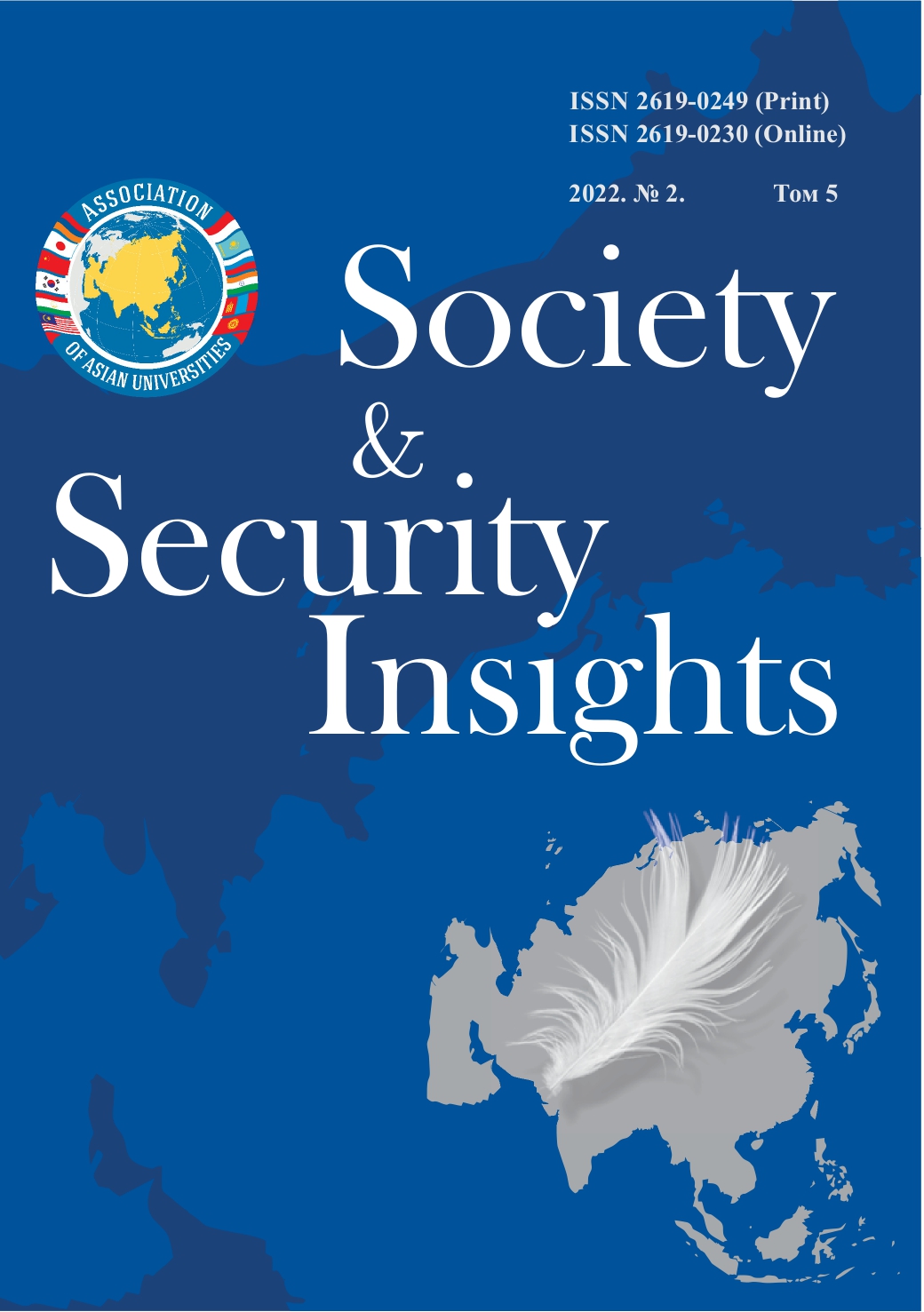EDUCATIONAL POTENTIAL OF THE POPULATION OF THE BORDER REGIONS OF RUSSIA
Main Article Content
Abstract
The relevance of the research proposed in the article is determined by the fact that one of the basic components of human capital is the educational potential of the population, whose qualitative characteristics determine the future development of the country. The purpose of the proposed article is to describe the specifics of the subjective and objective components of the educational potential of the population of border regions, as well as the motivation of citizens to optimize it in a regional context. The analysis of the functioning of indicators of intellectual capital and educational resources of the population is based on an interdisciplinary approach (economics, sociology, pedagogy); the theory of reproductive mechanisms for the dissemination of intellectual information at the macro, meso and micro levels of its implementation is used, the phenomenon of "lifelong education" and "lifelong education" is investigated. Conclusions are drawn that the actual factor of development and improvement of the efficiency of human capital is a high level of living.
Downloads
Metrics
Article Details

This work is licensed under a Creative Commons Attribution 4.0 International License.
Authors retain the copyright of their manuscripts, and all Open Access articles are distributed under the terms of the Creative Commons Attribution License, which permits unrestricted use, distribution, and reproduction in any medium, provided that the original work is properly cited.
References
Бродель Ф. Материальная цивилизация, экономика и капитализм, XV-XVIII вв, М.: Весь Мир, 2007. С. 13–15.
Брукинг Э. Интеллектуальный капитал. СПб, Питер, 2021. С. 15–17.
Васин В. А. Национальная инновационная система в социально-экономическом пространстве. М.: ИПРАН РАН, 2011. С. 89–91.
Вишневский А. Г. Серп и рубль. Консервативная модернизация в СССР. М.: ГУ-ВШЭ, 2010. С. 38–39.
Глазьев С. Ю. Новый технологический уклад в современной мировой экономике. Международная экономика. 2010. № 5. С. 5–27.
Горшков М. К. Непрерывное образование в контексте модернизации. М.: ИС РАН, ФГУП ЦСИ, 2011.
Гребенников О. В. Формирование у учащихся ценностного отношения к здоровому образу жизни. Концепт. 2016. № 24. С. 43–46.
Емельянов Ю. С. Человеческий капитал в модернизации России: Институциональный и корпоративный аспект. М.: Едиториал УРСС, 2011. С. 89–91.
Черепанова М. И. Региональное неравенство: проблемы демографического развития приграничных территорий Сибири. В кн.: Социальная несправедливость в социологическом измерении: вызовы современного мира: XII Международная научная конференция «Сорокинские чтения»: материалы. Москва, МГУ, 2018. C. 591–593.
Черепанова М. И. Отношение к мигрантам как прогноз национальной безопасности в приграничных регионах России. В кн.: Навстречу будущему. Прогнозирование в социологических исследованиях», Москва, АО «ВЦИОМ», 2017. C. 1016–1019.
Maksimova S., Surtaeva O., Cherepanova M. Migration policy as a factor in ensuring social security: expert opinion in cross-border regions of Russia. Proceedings of the International Conference on Sustainable Development of Cross-Border Regions: Economic, Social and Security Challenges (ICSDCBR 2019). Advances in Social Science, Education and Humanities Research. V.364. Atlantis Press, 2019. 737–741.
REFERENCES
Becker, G. S. (2013). Human behaviour: an economic approach. Selected Works on Economic Theory. Moscow.: GU-VSHE. (In Russ.).
Brodel, F. (2007). Material civilization, economy and capitalism, XV-XVIII centuries. Moscow: Ves’ Mir. (In Russ.).
Brooking, A. (2021). Intellectual capital. SPb, Peter. (In Russ.).
Vasin, V. A. (2011). National innovation system in the socio-economic space. M.: IPRAN RAN. (In Russ.).
Vishnevsky, A. G. (2010). Sickle and Ruble. Conservative Modernization in the USSR. M.: GU-VSHE. (In Russ.).
Glazyev, S. Yu. (2010). New technological structure in the modern world economy. International Economy, 5, 5-27. (In Russ.).
Gorshkov, M. K. (2011). Continuous education in the context of modernization. M.: IS RAN, FGUP TSI. (In Russ.).
Grebennikov, O. V. (2016). Formation of value-based attitude towards healthy life among students. Concept, 24, 43–46. (In Russ.).
Emelyanov, Y. S. (2011). Human capital in the modernization of Russia: Institutional and corporate aspect. Moscow: Editorial URSS. (In Russ.).
Cherepanova, M. I. (2018). Regional inequality: problems of demographic development of border territories of Siberia. In: Social injustice in the sociological dimension: the challenges of the modern world: XII International Scientific Conference "Sorokin Readings": Proceedings. Moscow, Moscow State University (pp. 591–593). (In Russ.).
Cherepanova, M. I. (2017). Attitudes towards migrants as a forecast of national security in the border regions of Russia. In: Towards the Future. Forecasting in sociological research. Moscow, VTSIOM JSC (pp. 1016–1019). (In Russ.).
Maksimova, S., Surtaeva, O., Cherepanova, M. (2019). Migration policy as a factor in ensuring social security: expert opinion in cross-border regions of Russia. In: Proceedings of the International Conference on Sustainable Development of Cross-Border Regions: Economic, Social and Security Challenges (ICSDCBR 2019). Advances in Social Science, Education and Humanities Research. V.364. Atlantis Press (pp. 737–741).


 https://orcid.org/0000-0001-8892-837X
https://orcid.org/0000-0001-8892-837X